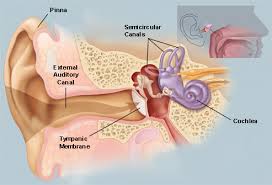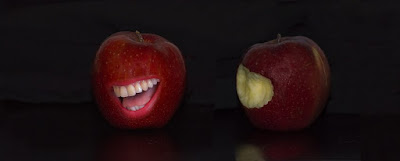 |
| image source Wikipedia |
It seems
to me that it is mostly little children who suffer from ear infections. The
reason for this is the shape of their Eustachian tubes as well as their
undeveloped immune system. An adult ear infection, though rare, is also
a possibility and can be very painful and debilitating.
Ear infection, or otitis media, is one of the most common health problems
among children. By the time your child is six years old, the chances are good
that she will have already have had one. In the United States alone, over 10 a million children each year see their doctors for this problem.
Ear Infections and Treatment
Your ear
is made up of three parts, the outer ear, middle ear, and inner ear. Ear
infections usually happen in the middle ear although it is possible also to
have inner ear infections.
We will
look here at the causes and symptoms of ear infections as well as providing you
with natural treatments so that you can select the best ear infection home
remedy for you or your loved one.
One note
of caution for you: Do not
go poking around in your ears, especially with Q-tips. Your ears are designed
with their own natural balancing system so can take care of themselves. By you
poking around in your ears you are likely to either damage them, like in
bursting your eardrum, or you might introduce harmful bacteria into them.
So what causes
ear infections?
Eustachian
Tube – The
Eustachian tubes (one in each ear) keep pressure from building up by letting
air move in and out of your middle ear. The Eustachian tube is drainage the conduit which prevents the secretions that are made in the middle ear from
building up and bursting your thin eardrum.
What it
does instead is allows these secretions to drain down the tube and be
swallowed. When this tube gets blocked this is when ear infections occur as
there is bacteria build up in your ear.
Some of
the things that can cause your Eustachian tube to become blocked are
respiratory infections, exposure to cigarette smoke, and allergies. There are
others as well such as increases in air pressure like when you take off in an
airplane.
You
cannot catch ear infections from other people, although you might catch a cold
from someone that then leads to an ear infection. If you have an ear infection,
you might have ear pain, a fever, or trouble hearing. You may even notice that
you are off-balance at times since your ears assist the body in keeping its
balance.
Can You Prevent Ear Infections?
You probably can't prevent all ear infections. But you can certainly cut
down on the number of earaches your child gets.
- It's important to try to
avoid smoking around your child. Kids who live with one or more smokers
are more prone to ear infections.
- Breastfed babies are less
likely to get ear infections.
- If you bottle feed, be
sure to prop your baby at a 30-degree angle if you're not holding him to
prevent fluid from draining into the middle ear.
- You can also massage your
child's ears to keep the eustachian tubes open. Remember to use gentle
pressure while doing this.
- Draw a line with your
finger along the back of the ear and down the back of the jawbone.
- Gently push and release
the skin in front of the ear several times.
- Put the fleshy part of
your palm, just below your thumb, over your child's ear and rotate the ear gently in all directions.
- A diet high in sugar
prevents your immune system from functioning properly. If your child is having repeat ear infections, it's probably worthwhile to reduce or eliminate sugar from his diet. Cut out fruit juice, too, as it's extremely high in sugar. Fresh fruit is a much better alternative.
- Xylitol is a natural
sugar found in many fruits. Research has shown that kids who chew gum
sweetened with xylitol had a lower risk of ear infections.
- Nearly half of all
children who have repeat ear infections have a food allergy of some sort.
Cow's milk and milk products are at the top of the list. Eggs, wheat,
corn, citrus fruits, and peanut butter are also common allergens. Try eliminating one food at a time to determine if your child has a food allergy, or talk to your child's doctor about allergy tests.
What are
the symptoms of ear infections?
1. Fever
2. Ear Pain
3. Imbalance
4. Problems hearing properly
5. Irritability
6. Trouble sleeping
7. Lack of appetite
8. Nausea
9. Vomiting
10. Dizziness
2. Ear Pain
3. Imbalance
4. Problems hearing properly
5. Irritability
6. Trouble sleeping
7. Lack of appetite
8. Nausea
9. Vomiting
10. Dizziness
Antibiotics May Not Be The Answer
Ear infections are usually treated with antibiotics. But is this really the
best course of action?
A study was done at the University Medical Centre in Utrecht, in The Netherlands, examined 240 kids between the ages of six months and two years who
were diagnosed with otitis media. Half received amoxicillin. The other half
weren't treated with antibiotics at all, but they were watched carefully to
make sure the infection didn't get worse.
Both groups were examined at four days, eleven days, and six weeks. The group treated with antibiotics got better a little faster, but there wasn't
much difference in the long-term outcome.
What this study shows is that most of the time, an ear infection will clear
up on its own without antibiotic treatment. This is important because overusing
antibiotics cause resistant strains of bacteria to develop. This means that
the antibiotic will no longer kill disease-producing bacteria like it did
before.
Antibiotic treatment can also have side effects. Allergic reactions,
nausea, vomiting, diarrhea, and yeast infections are common reactions to
antibiotics.
Let’s now
look at natural healing remedies for ear infections;
1. Ear Drops– Ear-Drops Benefits:
-Soothes the ear canal
-Supports balance in the ear
-Maintains healthy levels of wax in the ear canal
-Supports the overall health of the auditory system-Supports the health of the ear, naturally
-Maintains routine and normal levels of bacteria in the ear
-Supports healthy immune system functioning
-Supports balance in the outer, middle and inner ear
-Soothes the ear canal
-Supports balance in the ear
-Maintains healthy levels of wax in the ear canal
-Supports the overall health of the auditory system-Supports the health of the ear, naturally
-Maintains routine and normal levels of bacteria in the ear
-Supports healthy immune system functioning
-Supports balance in the outer, middle and inner ear
Herbal Ear Drops
Herbal remedies can help with repeat ear infections, but remember that it's
important to try to figure out what's causing them. Food allergies are often a
culprit, as mentioned above.
You can buy herbal ear drops in most natural food stores. Or you can make
your own.
Many ear drops contain glycerine. It helps to get rid of earwax, and it helps
to keep the drops in the ear because it's somewhat sticky. And it also helps
preserve the herbal oils.
Treat both ears as the herbs will protect the ear that's not infected. Put
the drops in the "good" ear first to prevent transferring the
infection with the dropper. Be sure to clean the dropper well and wipe it down
with alcohol before putting it back in the oil!
Note: If the fluid is oozing from your child's ear, or if you think your
child's eardrum is perforated, or that something (like a bean) is stuck in your
child's ear, don't use ear drops. Take your child to the doctor.
Mullein and Garlic Oil
- Fill a glass jar with
fresh mullein flowers. Don't pack them in.
- Cut 3-4 garlic cloves
into small pieces and add them to the flowers.
- Cover them with enough
olive oil to submerge the flowers and garlic. Stir the oil to remove any
air bubbles.
- Add 1/4 cup of glycerine
if desired. You should be able to buy it at a drugstore, or they can order
it for you.
- Cover it with a piece of
cheesecloth to let moisture from the flowers escape.
- Set it in a warm place,
like on top of the fridge, or in the sun, for three days. If you do this in the summer, be careful as the sun can really heat the oil up. You may just want to set it in the sun in the morning.
- Strain the flowers out.
Store it in a cool place, and it should keep for two years.
To
use, warm a few drops to body temperature, and put two to three drops in your
child's ears several times a day. Have him lie on his side while you do this,
and gently rub around his ear to help the oil run in.
Note: To make mullein oil, leave out the garlic. If you want garlic oil,
leave out the mullein. But both herbs work together so well, it's better to use
both if you have them on hand.
2. Ear Sprinkles– Ear Sprinkles Benefits:
-Soothes earache in children and babies
-Addresses waxy, “spongy” ears, gently and safely
-Improves ear health and comfort in babies and children under 10, safely
-Reduces inflammation associated with swimmer’s ear
-Soothes earache in children and babies
-Addresses waxy, “spongy” ears, gently and safely
-Improves ear health and comfort in babies and children under 10, safely
-Reduces inflammation associated with swimmer’s ear
3. Warm
Oil – saute some garlic and onion in olive oil. Use an eye dropper and
place a few drops of the oil into the infected ear. Let it stay in for about
5-10 minutes then lean your head to the side holding a paper towel to collect
what falls out of your ear. This is very soothing.
Leaving On A Jet Plane?
Most of us have been on a plane with a baby or small child screaming in
pain when the plane took off or landed. I feel so sorry for little ones in this
predicament! (And annoyed with their parents.)
Please try to avoid taking a child with an ear infection on a plane. It
probably won't damage the ear, but the change in cabin pressure as the plane
takes off and lands hurt like heck!
If you must travel when your child has an ear infection, try giving him
nasal decongestant drops and acetaminophen before you take off.
Be sure
to post a comment about what worked for you or if you know of any other natural
remedies not listed here please feel free to share them here with others who
are part of our community. Thanks for sharing.
Take Your Child To The Doctor If...
- your child's eardrum
ruptures. Your child may have sudden, severe pain, along with drainage from the ear. She may actually feel better because of the release of pressure when the eardrum perforates. I remember when this happened with my daughter. Her eardrum healed up on its own without any problems, but I
took her to the doctor so he could check her out.
- your child has a fever,
chills feel dizzy or have a serious hearing loss. The infection may have become worse or traveled to the inner ear.
- your child is lethargic and has a severe headache and a stiff neck. These are symptoms of
meningitis. Call your child's doctor right away, as this is very serious.

























